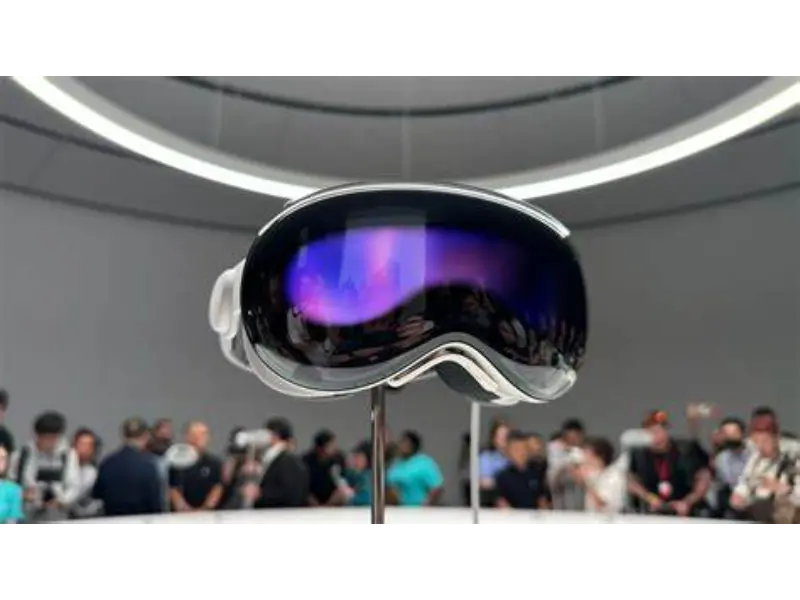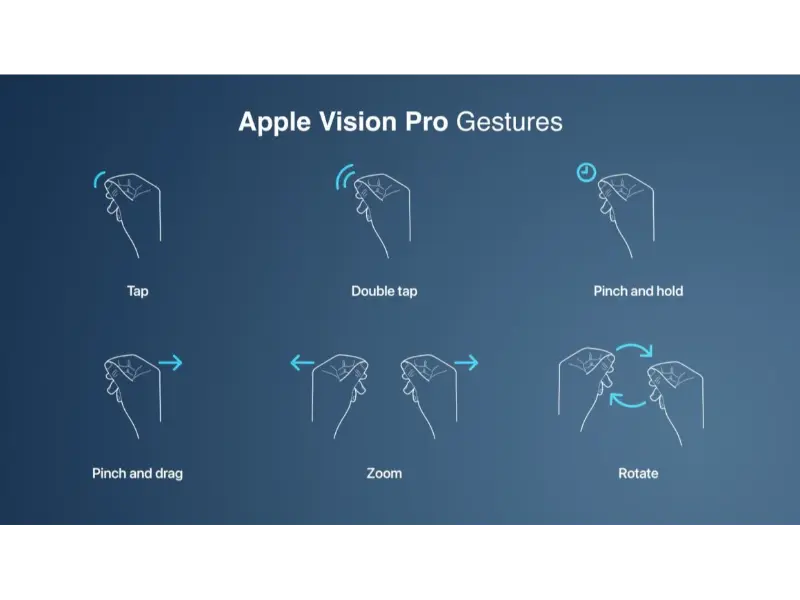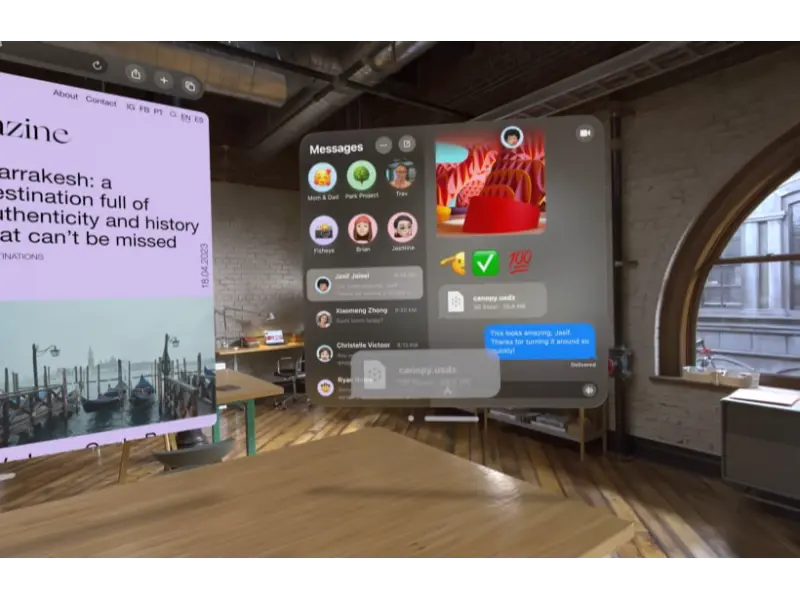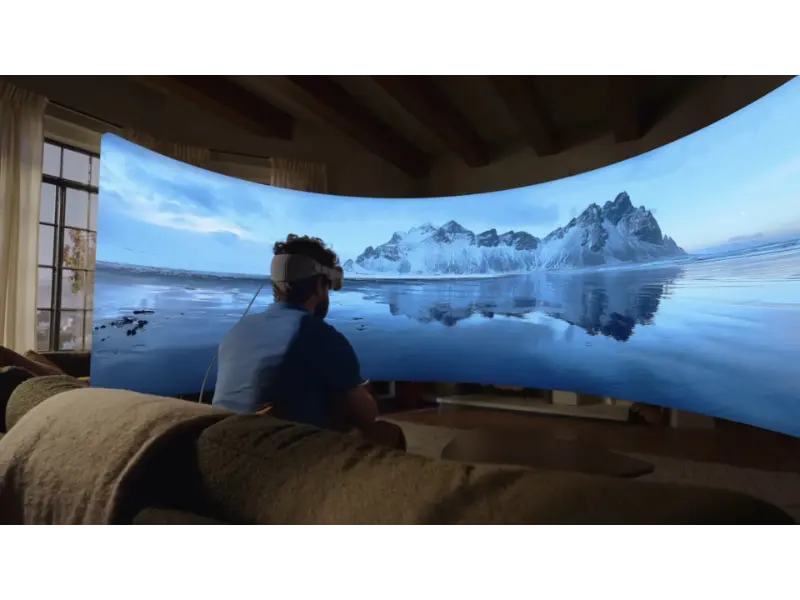- The Apple Vision Pro has become one of the most anticipated tech product launches of recent times, introducing a new way of combining the real and digital worlds for mixed reality experiences.
- Control with gestures and eye movements, it removes the need for hand-held controllers.
- It is designed to change how we work and play, offering new kinds of immersive experiences and supporting various apps.
- Its high price is unlikely to be a large hurdle, given Apple’s expertise at marketing and promoting must-have products.
In an industry brimming with innovation, Apple’s latest unveiling, the Vision Pro, has launched today, February 2, 2024. It emerges as a harbinger of the VR future, underscoring the tech behemoth’s audacious appetite for virtual and augmented reality. With its introduction, Apple not only brings forth a new gadget but also champions a groundbreaking concept in personal computing and entertainment, blending the digital and physical realms in ways previously unfathomable.
Understanding the Vision Pro
At first glance, the Vision Pro may appear as yet another contender in the saturated VR headset market. However, Apple’s proposition significantly deviates from traditional VR headsets. Housed in a sleek design, the Vision Pro is energised by Apple’s M2 chip and a novel R1 chip, crafted to meet the demands of spatial computing. This technological wonder amalgamates high-resolution cameras, a TrueDepth camera, and a LiDAR sensor, establishing unprecedented standards for mixed reality experiences.

Contrary to typical VR devices that whisk users away to entirely digital landscapes, the Vision Pro obscures the distinction between virtual and augmented reality. It superimposes digital information onto the tangible world while permitting users to plunge fully into virtual settings. This dual capability ensures unparalleled versatility, from augmenting productivity to transforming entertainment.
Also read: Apple’s Vision Pro battery pack: Surprise Lightning connector revealed
Gesture and eye control: a leap forward
Among the Vision Pro’s most innovative attributes is its reliance on gestures and eye movements for navigation, dispensing with the need for physical controllers. This intuitive interface signifies a monumental advancement in human-computer interaction, offering a sneak peek into a future where technology integrates effortlessly with our natural actions and gazes.

Pop quiz
How do users interact with the Vision Pro?
A. Using a keyboard and mouse.
B. Through gestures and eye movements.
C. With a stylus pen.
D. By voice commands only.
The answer is in the bottom of the article
Vision Pro in action
The potential applications of the Vision Pro are extensive and diverse. For professionals, it could revolutionise workspaces, enabling immersive presentations and collaborative ventures in virtual settings. Entertainment, too, adopts a novel dimension, with users capable of watching films in their virtual theatre or participating in FaceTime dance parties, experiencing a sense of presence unattainable through traditional screens.
The device’s content ecosystem stands on the brink of rapid expansion. Right out of the box, it supports an array of apps and services, including Apple TV, Messages, Mail, and a tailored App Store. The incorporation of third-party software and games, as demonstrated by the confirmed Disney+ app, suggests a vast, varied library of experiences awaiting users.
Also read: Apple’s Vision Pro: 3D Disney magic & guest mode unveiled
Market impact and debates
The launch of the Vision Pro has sparked debates across various fronts. Its $3,499 price tag prompts discussions on accessibility and whether the investment warrants the benefits. Comparisons with existing VR and AR solutions, such as the Meta Quest Pro, are inevitable, focusing on the Vision Pro’s advanced technology against its premium cost.
Both critics and enthusiasts deliberate over the broader ramifications of Apple’s foray. Will the Vision Pro herald a new chapter in spatial computing, akin to how the iPhone revolutionised mobile communication? Or will it remain an elite product, admired yet beyond the reach of the average consumer?

Opinions and expert insights
Industry insiders maintain cautious optimism regarding the Vision Pro’s impact. Analysts like Ming-Chi Kuo suggest that while the initial cost may hinder early adoption, future iterations could become more accessible, reflecting the trajectory of Apple’s past revolutionary offerings. Technology commentators underscore the device’s potential to redefine user interface design and mixed reality experiences.
User testimonials, albeit limited due to the product’s recent launch, resonate with astonishment and enthusiasm. Early adopters extol the seamless melding of digital and physical worlds, accentuating the device’s capacity to fundamentally alter our interaction with technology.
Also read: Apple’s Vision Pro headset: A glimpse into the in-store experience
The future beckons
As we teeter on the brink of this new technological epoch, the Apple Vision Pro invites us to reconceptualise the boundaries between the virtual and the real. Its debut poses as many questions as it resolves, urging us to contemplate the role of technology in our lives and its ability to either enhance or diminish our human experience.

The Vision Pro’s triumph will ultimately rest on its capability to transcend its status as a luxury item, evolving into a tool that enriches daily life for a wide audience. In this endeavour, Apple has thrown down a formidable challenge, not only to its competitors but to society at large, as we grapple with the implications of inhabiting a world where every surface can be a screen, and every space can embody both reality and imagination.
As the Vision Pro finds its way into the hands of global users, its true influence remains to be seen. Yet, one thing is unequivocally clear: the future of personal computing and entertainment has never appeared more thrilling—or more ambiguous.
Answer: B.Through gestures and eye movements.

